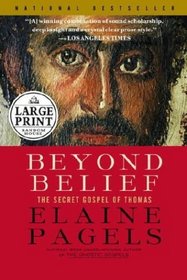Elaine Pagels first came to my attention on PBS; she was commenting on some facet of the Bible, the focus of the program. Since then, I've seen her a number of times when she has been interviewed regarding historical aspects of the Bible. I've found her opinions to be intelligent and shared succinctly. When I found this book discussing the cache of texts and fragments found in a jar in Nag Hamadi (Egypt, found in 1945), I knew she would shed some historical light on these works.
I was not disappointed; Pagels set the scene to explain why these banned works might have been hidden around 360 AD. When we look at religion today, everything seems clear and organized. However, after Christ's death, the emerging Church was in conflict and in flux.
The fact that Dr. Pagels is not a theologian is a bonus; she looks at the Nag Hamadi texts and pieces from the view of a historian. She helped me see why these texts were not selected for the final version of the New Testament. I am always surprised by the disparity between Mathew, Mark, Luke and John's version of God's story . Now I see that there were many more versions of God's story that were not selected for the final version of the New Testament.
Pagels explains that Iraneous, the Bishop of Lyons, was trying to weave various factions of the emerging Church into a more cohesive whole. Iraneous viewed John's gospel to be the most important of the four gospels. Only in John is Christ equated with God; in the other gospels, Christ is a paragon of goodness (Christ is not called God).
Probably the most important reason Iraneous did not select the Thomas text was the fact that Thomas did not say Christ was divine; his writings encouraged touching the Divine through deep thought and ritual. Neither of those two things required an organized Church. Hmmmmm.
Pagels paints Iraneous with an all-too-human stroke of the brush. He did not seem to think women capable of understanding spirituality. From Pagel's quotes by this bishop, the reader can see that he was fairly pompous and narrow minded. But through his tireless efforts to condense the news of Christ's life into the New Testament, he probably saved the Christian Church from devolving into countless warring factions (that might eventually have killed the Christian movement).
I find Pagels to be highly readable and she explains the complex geopolitical facts of the time that had such an effect on the early Christian believers.
I was not disappointed; Pagels set the scene to explain why these banned works might have been hidden around 360 AD. When we look at religion today, everything seems clear and organized. However, after Christ's death, the emerging Church was in conflict and in flux.
The fact that Dr. Pagels is not a theologian is a bonus; she looks at the Nag Hamadi texts and pieces from the view of a historian. She helped me see why these texts were not selected for the final version of the New Testament. I am always surprised by the disparity between Mathew, Mark, Luke and John's version of God's story . Now I see that there were many more versions of God's story that were not selected for the final version of the New Testament.
Pagels explains that Iraneous, the Bishop of Lyons, was trying to weave various factions of the emerging Church into a more cohesive whole. Iraneous viewed John's gospel to be the most important of the four gospels. Only in John is Christ equated with God; in the other gospels, Christ is a paragon of goodness (Christ is not called God).
Probably the most important reason Iraneous did not select the Thomas text was the fact that Thomas did not say Christ was divine; his writings encouraged touching the Divine through deep thought and ritual. Neither of those two things required an organized Church. Hmmmmm.
Pagels paints Iraneous with an all-too-human stroke of the brush. He did not seem to think women capable of understanding spirituality. From Pagel's quotes by this bishop, the reader can see that he was fairly pompous and narrow minded. But through his tireless efforts to condense the news of Christ's life into the New Testament, he probably saved the Christian Church from devolving into countless warring factions (that might eventually have killed the Christian movement).
I find Pagels to be highly readable and she explains the complex geopolitical facts of the time that had such an effect on the early Christian believers.




